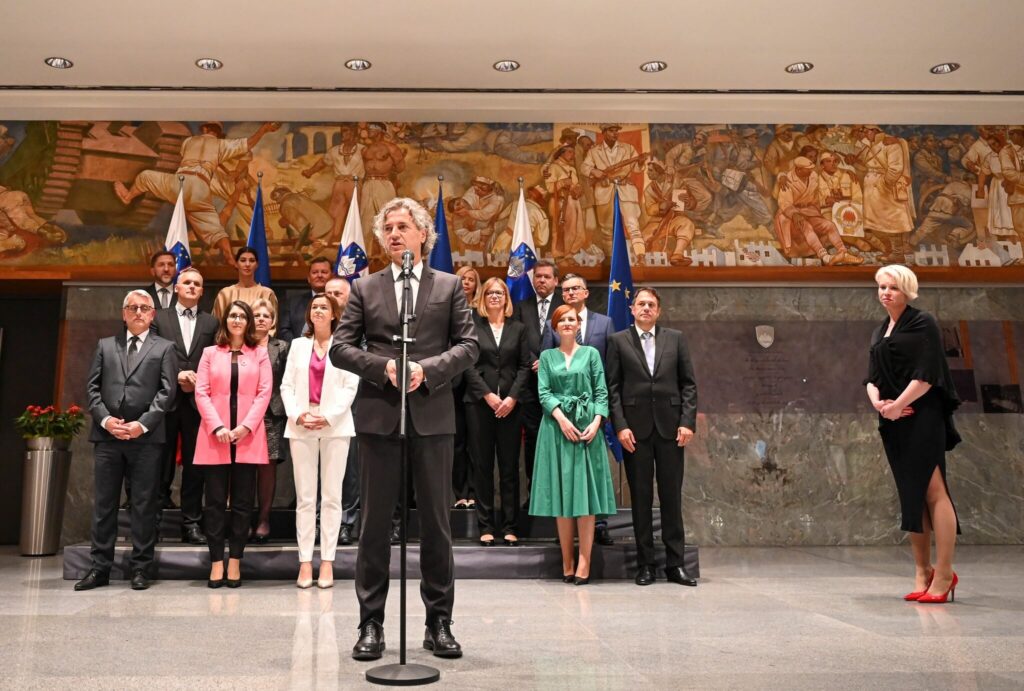The summary of the Standard Eurobarometer 100 – Autumn 2023 opinion poll, conducted in the European Union, including Slovenia, between the 23rd of October and the 17th of November 2023, is now available. Among other findings, the survey shows that Slovenians stand out in terms of their low level of trust in domestic institutions of government and pessimism about the future, while inflation and immigration are our main concerns.
The annual report of the Standard Eurobarometer for Slovenia is part of the regular publications measuring public opinion in the European Union, which shows the views of the Slovenian public and other European citizens on the European Union (EU), as well as on current political and social affairs in their respective countries and the EU as a whole.
A large majority, 93 percent of Slovenians, are satisfied with their lives, which puts Slovenians among the more satisfied citizens in the EU, where on average, 84 percent of Europeans are satisfied with their lives. Respondents are more critical of the state of the country’s economy, with more than half of Slovenians rating it as critical (48 percent as good, 51 percent as poor).
Inflation and immigration are the biggest challenges
The biggest challenge that Slovenia is facing at this time is the rising prices/inflation or the rising cost of living, which was highlighted by more than a third of the Slovenians surveyed, and it is also the same for other Europeans. Immigration is the second most challenging issue in the opinion of the respondents, while other issues are losing ground. Respondents are quite dissatisfied with the current direction of things in their countries; almost two-thirds of Slovenians and a slightly lower share of Europeans think that things are not going in the right direction – a trend that shows an increase in dissatisfaction compared to spring 2023.
Slovenians among the most pessimistic about the future
Just under a quarter of Slovenians (24 percent) are currently satisfied with the direction of development in Slovenia, and the majority (63 percent) believe that things are headed in the wrong direction. Pessimism is most prevalent when it comes to the general situation in the country, or most of all about the economic situation in Slovenia, where almost half (49 percent) of Slovenians expect the situation to worsen in the future. Among the twenty-seven European Union countries, Slovenians are among the most pessimistic, with only respondents in the Czech Republic expressing less optimism about their country’s situation in the next year.
Only one in five Slovenians trust the Slovenian government
The majority of Slovenians (80 percent) feel as if they are EU citizens, which is above the EU27 average (72 percent). The EU’s image in the eyes of Slovenians is either neutral or positive, with only a minority seeing the EU negatively. Respondents are overwhelmingly distrustful of the authorities and international political institutions, with Slovenians standing out in particular for their low level of trust in domestic institutions, which is one of the lowest among all Member States. Only one in five Slovenians (20 percent) trust the Slovenian government, while 77 percent do not trust it, a result which puts Slovenia at the very bottom of the EU27 ranking in terms of trust in the national government. A fairly similar level of trust was expressed towards the Slovenian National Assembly, which is trusted by 21 percent of Slovenians, while 76 percent do not trust it.
Strong support for the euro and free movement of citizens, less for immigration policy
The policies with the highest levels of support in Slovenia are the common economic and monetary union with the euro and the free movement of citizens to live, work, study and do business in the EU – both of which exceed 90 percent and 80 percent consensus, respectively. The various common policy proposals have at least 50 percent support among Slovenians, with noticeably fewer Slovenians than the EU27 average supporting the proposal for a common European policy on immigration.
TV and radio are the most common sources of information, but trust in the media is falling due to pressures
Television and radio are the main individual sources of information on European political issues for EU citizens, with print media losing the most importance.
Slovenians are also critical of the credibility of the national media, with the majority of respondents believing that they are not trustworthy. Most respondents believe that the media operate under political or market pressure and that they often present misleading or false information, which most respondents are able to identify.
The survey was carried out in 37 countries or territories: the 27 Member States of the European Union, the seven candidate countries for EU accession (Albania, Bosnia and Herzegovina, Moldova, Montenegro, North Macedonia, Serbia, Turkey), the Turkish Cypriot area of Cyprus, the United Kingdom and the Kosovo area, between the 23rd of October and the 17th of November 2023. The results of the survey are interpreted in the context of the current socio-economic situation, which includes both the rise in food prices and changes in energy supply due to the war in Ukraine, for which there is no solution in sight, and the fact that Slovenia was hit by the worst floods in its history in August. In Slovenia, 1017 interviews were carried out using the Computer Assisted Personal Interviewing (CAPI) method in households. The interviews were carried out by the Mediana agency.
Tanja Brkić


